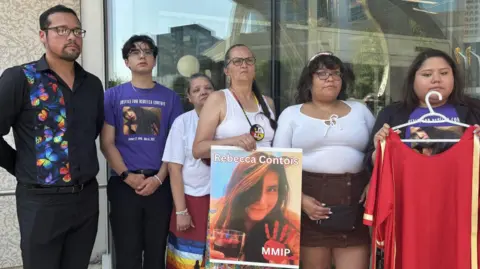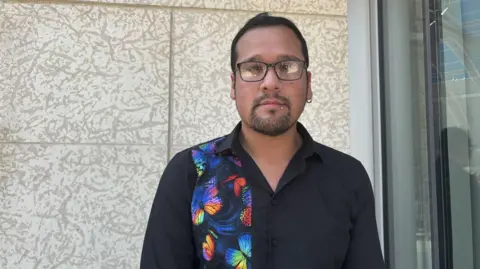Through Nadine Joseph, BBC News, Winnipeg
 BBC
BBCI’m glad it erupted in a packed Canadian courtroom on Thursday, when a judge found a serial killer charged with first-degree murder in the deaths of four local women.
Jeremy Contois’ reaction in the courtroom, however, was reserved.
His younger sister Rebecca was one of the oldest women killed in the city of Winnipeg, Manitoba, two years earlier.
“I feel a little relieved,” Mr Contois said, adding, however, that the case will not have complete closure until the killer, Jeremy Skibicki, is officially convicted.
In his oral decision, Judge Glenn Joyal of the Manitoba Court of King’s Bench rejected the defense’s argument at trial that the accused were not criminally responsible for the murders.
Lawyers for Skibicki, 37, said he was suffering from schizophrenia in the month of the murders.
Prosecutors argued that Skibicki murdered Ms. Contois and three other women in 2022 in deliberate and racially motivated crimes.
Ultimatum: This story contains salient points that readers may find disturbing.
The killings and the trial that continued over the next week shocked Canada’s indigenous population, which has long grappled with violence against its women.
Skibicki, dressed in a gray T-shirt and pants, did not react as he read out the gist of his decision aloud to Joyal.
One of Ms Contois’s people snapped a large photograph of Rebecca as she left the court.
“Why did I pick up his photo? Because we, First Nations people, are not statistics,” Christa Fox said later.
“Each one of us has a name, and a family that misses us very much.”
Skibicki’s patients are Morgan Harris, 39, Marcedes Mayran, 26, and Ms Contois, who was 24. The fourth woman has not yet been located, and has been named Mashkode Biziki’ikwe, meaning Buffalo Girl, indigenous elder.
During the trial, a buffalo head still sat on a purple cloth on a table pointing at the prosecutors in tribute to the unidentified victim.
In his ruling, the judge on Joyal said that the accused had not demonstrated that he was not criminally responsible for the murders, rejecting the testimony of Dr. Sohom Das, a British psychiatrist who had said that Skibicki was suffering from delusions. Was ambitious. When he committed the murders.
The judge further stated that the “brutally graphic” details of the case were “largely uncontested”, as the accused had admitted to the murders in police interviews and in court before the trial.
Skibicki had requested to no longer hold office due to a psychological illness.
The court of 100 was packed with families and friends of the four women for the verdict.
The ruling on Joyal noted that the case has had an undeniable and profound impact on “the entire Manitoba community, Indigenous and non-Indigenous.”
Skibicki faces up to a month behind bars, with interest now turning to finding his two remaining victims, Ms. Myron and Ms. Harris, who are believed to be in a Winnipeg landfill.
For this autumn, looking forward to finding a suitable one for the next months drive from their homes.

‘Deliberate and functional’ killings
According to court documents, Skibicki murdered the women between March and May of 2022, with Ms Contois considered a typical victim.
He met at least two at local homeless shelters in Winnipeg, a city of 820,000 in the Prairie province.
Pass a positive verdict on Joyal with prosecutors finding that she knowingly targeted and exploited “vulnerable” women.
During the trial process, the court heard that Skibicki assaulted the women, strangled or drowned them and had sex with them before dismembering their bodies and dumping them in garbage boxes.
The murders went undiscovered for months, until a man looking for scrap steel in a bin outside Skibicki’s apartment in May 2022 found discarded human remains and called the police.
“She has obviously been murdered,” the man said in the 911 call, which was played in court.
Police were able to identify Shesh as Ms. Contois.
The rest of it was found in a city-run landfill, please see Generation.
In a police interview shortly after his arrest, Skibicki surprised authorities by admitting to killing Ms Contois and three other people.
At the time, police denied knowledge of alternative deaths.
Speaking outside court, Ms Fox said she believed it was only possible because the rest of Ms Contois’s family knew other families were able to get justice.
Skibicki’s lawyers tried to argue that he was not fully aware of the severity of his movements due to schizophrenia-induced delusions. He argued that he was hearing voices that were informing him to commit crimes as part of a project from God.
Prosecutors argued that Skibicki was fully aware of his actions, saying they were “deliberate, purposeful and racially motivated”.
They demonstrated this through DNA forensic evidence, surveillance photos showing Skibicki with women in his final days, as well as testimony from his ex-wife, which revealed a history of physical abuse.
If Skibicki had not been found criminally responsible for the four murders, it would have been a relative lapse in Canadian law.
Between 2000 and 2022, only 5,178 — or 0.06% — of the 8,883,749 criminal cases prosecuted across the country had such verdicts, according to Canadian Statistics Agency data and reporting by the Globe and Mail newspaper.
 AFP via Getty Pictures
AFP via Getty PicturesThe case exposed deep wounds for Canada’s Indigenous peoples, who have long grappled with major cases of their girls being missing or murdered.
Winnipeg – a city belonging to diverse Indigenous communities – had the highest number of missing and murdered Indigenous women in Canada between 2018 and 2022, according to an investigation by the Aboriginal Peoples TV Network.
Across Canada, Indigenous women are 12 times more likely to be murdered or missing than other women, according to a 2019 investigation.
Some of the town’s indigenous women remain missing, leading people to fear that there are more patients in Skibiki.
The Crown, on the other hand, said they did not believe he had murdered more women.
Despite being close to the judge’s verdict, Rebecca’s brother, Mr Contois, said he still wondered why his sister – who was also the mother of a young daughter – was murdered so brutally.
“Why did he have to do that?” He mentioned. “I wish I knew this.”
Discover more from news2source
Subscribe to get the latest posts sent to your email.





